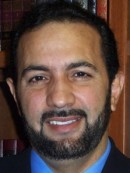My Word: We’re never too powerless to protest
 (Orlando Sentinel, September 4, 2013)
(Orlando Sentinel, September 4, 2013)
By Muhammad Musri
When I heard that hundreds of people in Syria had been killed by chemical warfare, I recoiled in horror, as did most Americans. But for me, the implications hit even closer to home.
You see, I was born in Lebanon. Syria was our next-door neighbor. In fact, it was in Syria that I did my studies to become an imam. I have fond memories of my time there. I have many Syrian friends. Some of those friends have been killed or have lost loved ones. Their hopes and dreams have been shattered.
Currently, hundreds of thousands of Syrians are desperately seeking refuge in other countries. They live in either a war zone or a refugee camp.
As I’ve looked at the pictures of row upon row of cloth-wrapped corpses, it’s clear that many of the dead are women and children. By any standard, what has been done is an atrocity.
Such an atrocity — whichever side is eventually shown to have been the perpetrator — is a violation of international law. It’s also a violation of the requirements of Islam, which prohibit killing women, children and the elderly even in war.
And it’s a violation of the principles held by moral people around the world — people of every religion and no religion.
As mere citizens, we may have no direct control over how or if we should respond at the national level. But as famed Holocaust survivor Elie Wiesel has pointed out: There may be times when we are powerless to prevent injustice, but there must never be a time when we fail to protest.
Too often humans seek to excuse evil by claiming that the others have done equally bad things. Such tit-for-tat moral mathematics is bogus. No action justifies killing women and children in such a manner. It’s a crime against humanity, whoever does it.
In the Quran, God said that when someone kills another, it’s as if he has killed the whole of humankind. Conversely, God said that when someone saves another, it’s as if he has saved the whole of humankind.
The latter is the role that moral people are called to play, irrespective of the religious, ethnic or national labels they may wear.
Imam Muhammad Musri is president of the Islamic Society of Central Florida and a member of the advisory board of the Interfaith Council of Central Florida.
